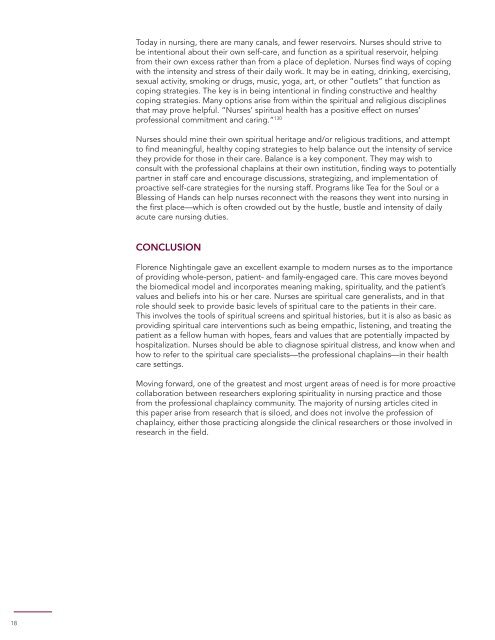S piritual Care and Nursing A Nurse’s Contribution and Practice
UsmH30a0tgV
UsmH30a0tgV
You also want an ePaper? Increase the reach of your titles
YUMPU automatically turns print PDFs into web optimized ePapers that Google loves.
Today in nursing, there are many canals, <strong>and</strong> fewer reservoirs. Nurses should strive to<br />
be intentional about their own self-care, <strong>and</strong> function as a s<strong>piritual</strong> reservoir, helping<br />
from their own excess rather than from a place of depletion. Nurses find ways of coping<br />
with the intensity <strong>and</strong> stress of their daily work. It may be in eating, drinking, exercising,<br />
sexual activity, smoking or drugs, music, yoga, art, or other “outlets” that function as<br />
coping strategies. The key is in being intentional in finding constructive <strong>and</strong> healthy<br />
coping strategies. Many options arise from within the s<strong>piritual</strong> <strong>and</strong> religious disciplines<br />
that may prove helpful. “Nurses’ s<strong>piritual</strong> health has a positive effect on nurses’<br />
professional commitment <strong>and</strong> caring.” 130<br />
Nurses should mine their own s<strong>piritual</strong> heritage <strong>and</strong>/or religious traditions, <strong>and</strong> attempt<br />
to find meaningful, healthy coping strategies to help balance out the intensity of service<br />
they provide for those in their care. Balance is a key component. They may wish to<br />
consult with the professional chaplains at their own institution, finding ways to potentially<br />
partner in staff care <strong>and</strong> encourage discussions, strategizing, <strong>and</strong> implementation of<br />
proactive self-care strategies for the nursing staff. Programs like Tea for the Soul or a<br />
Blessing of H<strong>and</strong>s can help nurses reconnect with the reasons they went into nursing in<br />
the first place—which is often crowded out by the hustle, bustle <strong>and</strong> intensity of daily<br />
acute care nursing duties.<br />
CONCLUSION<br />
Florence Nightingale gave an excellent example to modern nurses as to the importance<br />
of providing whole-person, patient- <strong>and</strong> family-engaged care. This care moves beyond<br />
the biomedical model <strong>and</strong> incorporates meaning making, s<strong>piritual</strong>ity, <strong>and</strong> the patient’s<br />
values <strong>and</strong> beliefs into his or her care. Nurses are s<strong>piritual</strong> care generalists, <strong>and</strong> in that<br />
role should seek to provide basic levels of s<strong>piritual</strong> care to the patients in their care.<br />
This involves the tools of s<strong>piritual</strong> screens <strong>and</strong> s<strong>piritual</strong> histories, but it is also as basic as<br />
providing s<strong>piritual</strong> care interventions such as being empathic, listening, <strong>and</strong> treating the<br />
patient as a fellow human with hopes, fears <strong>and</strong> values that are potentially impacted by<br />
hospitalization. Nurses should be able to diagnose s<strong>piritual</strong> distress, <strong>and</strong> know when <strong>and</strong><br />
how to refer to the s<strong>piritual</strong> care specialists—the professional chaplains—in their health<br />
care settings.<br />
Moving forward, one of the greatest <strong>and</strong> most urgent areas of need is for more proactive<br />
collaboration between researchers exploring s<strong>piritual</strong>ity in nursing practice <strong>and</strong> those<br />
from the professional chaplaincy community. The majority of nursing articles cited in<br />
this paper arise from research that is siloed, <strong>and</strong> does not involve the profession of<br />
chaplaincy, either those practicing alongside the clinical researchers or those involved in<br />
research in the field.<br />
18


